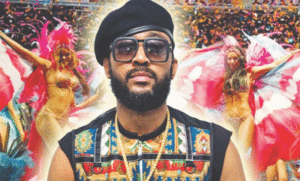Machel Montano, the “King of Soca,” had always been at the forefront of the Soca music scene, but in 2024, he surprised everyone by announcing his absence from Carnival festivities to focus on completing his master’s degree in Carnival Studies at the University of Trinidad and Tobago (UTT). This decision sent shockwaves through the Soca community, as fans wondered how the Carnival could go on without its beloved superstar.

Montano’s academic pursuit was no small feat. His thesis required an intense study of the history of Calypso, Steelband, and Mas, as well as academic writing, history, and social science. But he saw it as a necessary sacrifice to set a foundation for the next generation of artists. He believed that understanding the roots of Calypso and its cultural significance was essential for the evolution of Soca music. As he put it, “If you don’t know where you are coming from, you can’t know where you are going.”
While Montano’s absence left a void in the Carnival scene, his dedication to his studies was unwavering. He emphasized that this was a crucial step towards ensuring the continued growth and relevance of Soca and Calypso. It was as if he saw himself as the child of Calypso, returning to support and rebuild the genre that had nurtured him over the years.

As Montano took his academic journey, the Soca world anxiously awaited his return. However, it wasn’t long before Montano surprised everyone yet again. At the Calypso Fiesta in Skinner Park, San Fernando, he made an unexpected appearance, emerging from a speaker box dressed in a graduation gown. This spectacle symbolized the unity of Soca and calypso, a testament to the interconnectedness of these two genres.
Montano’s performance of his track “Soul of Calypso” was electrifying, serving as a celebration of his academic journey and a tribute to the vibrant Calypso culture. It was a reminder that even while pursuing higher education, he remained deeply connected to his musical roots.
Despite his temporary departure from the Carnival fete circuit, Montano’s presence in the music scene continued to loom large. His academic endeavors had not only expanded his horizons but also deepened his appreciation of carnival heritage. Fans eagerly anticipated the possibility of his participation in Dimanche Gras, a major event in the carnival calendar.
In the end, Montano’s decision to take a break from the Carnival scene and immerse himself in the study of Carnival arts showcased his commitment to preserving the roots of Calypso and Soca. His journey not only enriched his understanding but also served as an inspiration for the future of Caribbean music. If he emerged victorious in this endeavor, he would solidify his status as a true legend, being the only person to win all the major competitions in his native Trinidad and Tobago. The story of Montano’s return to his roots is not just about his personal journey, it is also about the continued evolution and unity of Soca and Calypso, ensuring that these musical traditions would thrive for generations to come.


